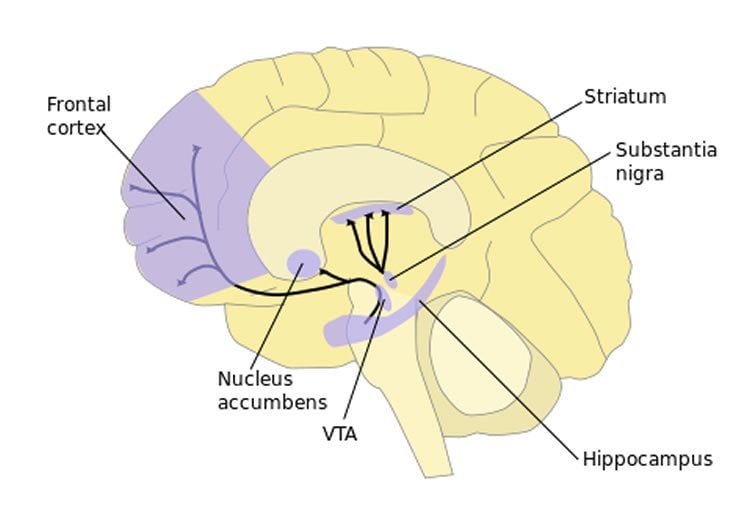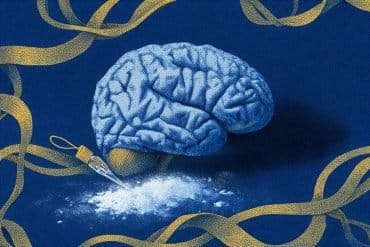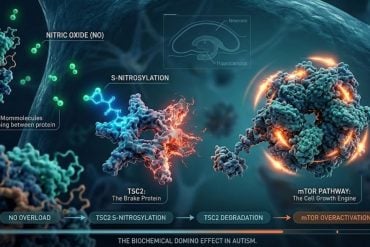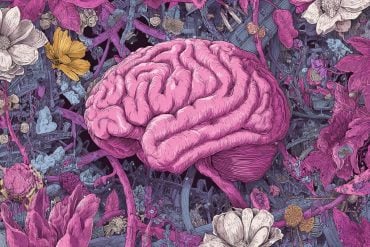Summary: Researchers report a blockade of D2 receptors in interneurons can increase acetylcholine signaling above threshold on neighboring neurons, resulting in motor abnormalities.
Source: UC Irvine.
UCI study points to targeted pharmaceutical approach for eliminating this problem.
Since their development in the 1950s, antipsychotic drugs have been widely used to treat psychoses and neuropsychiatric disorders like schizophrenia. A debilitating side-effect of these drugs called parkinsonism limits their efficacy.
University of California, Irvine scientists led by Emiliana Borrelli and colleagues have discovered the key cellular mechanism that underlies the antipsychotic-induced parkinsonism – which includes involuntary movements, tremors and other severe physical conditions. These studies present evidence that will stimulate a targeted approach for the design of novel antipsychotics without side-effects.
In the journal Neuron, the researchers report that antipsychotics side-effects are due to blockade of the dopamine D2 receptor in a specialized type of neurons in the striatum, called interneurons. Blockade of D2 receptor in these neurons increases neurotransmitter signaling (acetylcholine) above threshold on neighbor neurons leading to motor abnormalities in rodents (catalepsy) and in humans (parkinsonism). Catalepsy is marked by severe muscular rigidity and fixity of posture regardless of external stimuli. Indeed, in mouse studies, the Borrelli team discovered that removing D2 receptors in nerve cells (cholinergic interneurons) did not result in catalepsy in the mice upon antipsychotic treatment.

Borrelli said the importance of this study is twofold. It clarifies a long-waited mechanism that allows to explain the motor side-effects of antipsychotic drugs and will help future design of drugs deprived of nasty side-effects. It also generates important information for combined therapies (using drugs that block D2 but also acetylcholine receptors) that should be used to improve the life of people treated for debilitating psychiatric disorders.
Borrelli is a professor of microbiology & molecular genetics. She is affiliated with the Center for Epigenetics & Metabolism in the School of Medicine and is the Inserm research director at the University of California.
Funding: Karen Brami-Cherrier, Geetika Kharkwal, Maria Ramos and Daniel Del Barrio with UCI, Jose Lizardi-Ortiz and David Sulzer with Columbia University; and Alexandra Nelson and Anatol Kreitzer with the Gladstone Institute in San Francisco contributed to the study, which received support from Inserm and the National Institutes of Health (grants DA024689; DA033554).
Source: Tom Vasich – UC Irvine
Image Source: This NeuroscienceNews.com image is in the public domain.
Original Research: Full open access research for “Parkinsonism Driven by Antipsychotics Originates from Dopaminergic Control of Striatal Cholinergic Interneurons” by Geetika Kharkwal, Karen Brami-Cherrier, José E. Lizardi-Ortiz, Alexandra B. Nelson, Maria Ramos, Daniel Del Barrio, David Sulzer, Anatol C. Kreitzer, and Emiliana Borrelli in Neuron. Published online July 6 2016 doi:10.1016/j.neuron.2016.06.014
[cbtabs][cbtab title=”MLA”]UC Irvine. “Dopamine Receptor Blockage Could Be Cause For Side Effects of Some Antipsychotics.” NeuroscienceNews. NeuroscienceNews, 6 July 2016.
<https://neurosciencenews.com/dopamine-receptor-antipsychotic-side-effects-4626/>.[/cbtab][cbtab title=”APA”]UC Irvine. (2016, July 6). Dopamine Receptor Blockage Could Be Cause For Side Effects of Some Antipsychotics. NeuroscienceNews. Retrieved July 6, 2016 from https://neurosciencenews.com/dopamine-receptor-antipsychotic-side-effects-4626/[/cbtab][cbtab title=”Chicago”]UC Irvine. “Dopamine Receptor Blockage Could Be Cause For Side Effects of Some Antipsychotics.” https://neurosciencenews.com/dopamine-receptor-antipsychotic-side-effects-4626/ (accessed July 6, 2016).[/cbtab][/cbtabs]
Abstract
Parkinsonism Driven by Antipsychotics Originates from Dopaminergic Control of Striatal Cholinergic Interneurons
Highlights
•D2R signaling directs the striatal dopamine/acetylcholine balance
•D2R signaling controls the in vitro “pause” of striatal cholinergic interneurons
•Antipsychotic-induced catalepsy depends on D2R blockade on cholinergic interneurons
•Acetylcholine signaling on medium spiny neurons induces catalepsy
Summary
Typical antipsychotics can cause disabling side effects. Specifically, antagonism of D2R signaling by the typical antipsychotic haloperidol induces parkinsonism in humans and catalepsy in rodents. Striatal dopamine D2 receptors (D2R) are major regulators of motor activity through their signaling on striatal projection neurons and interneurons. We show that D2R signaling on cholinergic interneurons contributes to an in vitro pause in firing of these otherwise tonically active neurons and to the striatal dopamine/acetylcholine balance. The selective ablation of D2R from cholinergic neurons allows discrimination between the motor-reducing and cataleptic effects of antipsychotics. The cataleptic effect of antipsychotics is triggered by blockade of D2R on cholinergic interneurons and the consequent increase of acetylcholine signaling on striatal projection neurons. These studies illuminate the critical role of D2R-mediated signaling in regulating the activity of striatal cholinergic interneurons and the mechanisms of typical antipsychotic side effects.
“Association of Marijuana Use With Blunted Nucleus Accumbens Response to Reward Anticipation” by Meghan E. Martz, MS; Elisa M. Trucco, PhD; Lora M. Cope, PhD; Jillian E. Hardee, PhD; Jennifer M. Jester, PhD; Robert A. Zucker, PhD; and Mary M. Heitzeg, PhD in JAMA Psychiatry. Published online July 6 2016 doi:10.1001/jamapsychiatry.2016.1161






